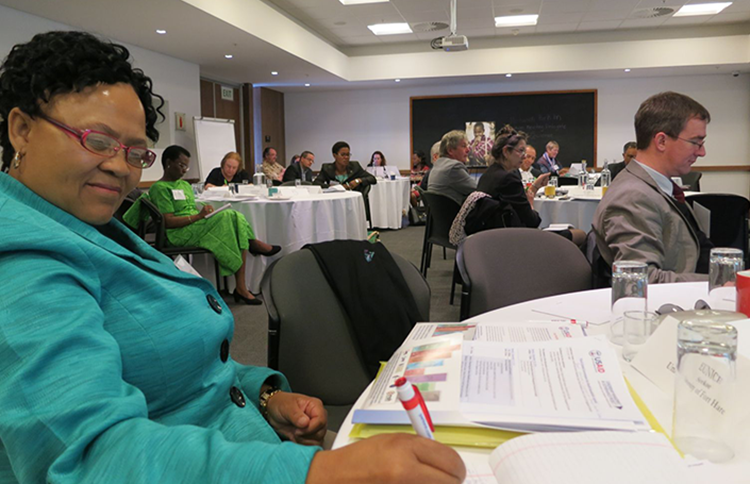The Health Policy Project ended in 2016. Work continued under Health Policy Plus (HP+) until 2022.
NEWS & VIEWS

Participant Eunice Seekoe. Head of the School of Health Sciences at the University of Fort Hare, South Africa. Photo by the Leadership, Management, and Governance Project.
Jay Gribble, Deputy Director, FP/RH and Senior Fellow
Health Policy Project, Futures Group
September 29, 2014
As preliminary sessions get underway this week at the Third Global Symposium on Health Systems Research, I am excited about what will transpire. The theme of this year’s meeting, people-centered systems, presents an interesting juxtaposition of ideas. On one hand, systems can be impersonal, bureaucratic, and non-responsive to what we as individuals want and need On the other hand, intuitive, responsive systems are critical to the functioning of our health systems and without them, policies would not be implemented, services would not be provided, supply chains would not work, and staff would not know where or when to show up for work. Over the next few days, I’ll attend separate meetings on health governance and complex systems. I look forward to exploring the overlap between these two very different issues. Governance systems are critical in ensuring that citizens have a say in how health services are provided, which types of services are included in basic health packages, the quality of those services, and the underlying policies that mandate that the services be offered. Yet the groups that have the greatest need for health services—the poor and marginalized—are often excluded from the governance process and systems.
While governance brings a human perspective to health systems, it is systems themselves that make things happen. As the development community’s understanding of and responses to health needs become increasingly complex, the complexity of systems must be considered. Complexity science offers tools for health scientists, policymakers, and researchers to help think about how to better provide health services by drawing on many different types of data. Informed policy making should take into account epidemiology (the distribution of health conditions in the population); the interrelated factors that lead people to have multiple and complex health concerns; the proximity of health services to the people who need them; the behavioral and social factors that underlie people’s exposure to health risks and conditions, and how they respond to those risks; and financial structures that underwrite the costs of providing health services, to mention only a few. Regardless of the health concern—HIV treatment, avoiding unintended pregnancy, the spread of Ebola—complexity science offers policymakers and program implementers powerful tools that consider the interactions among different types of forces.
Through my experiences addressing family planning worldwide, I’ve learned that we need to ensure that young people, women, and men are represented in governance systems, and that their involvement holds decisionmakers accountable for following through on the performance of health systems. As the meetings unfold this week, it will be interesting to hear what presenters have to say about health governance—the people, processes, and structures that must be in place to make the system work. My colleagues on the USAID-funded Health Policy Project work to ensure that people whose voices need to be heard have the capacity to speak up, that civil servants and public officials are open to hearing them, and that systems are adaptable and provide recourse when health systems do not accomplish what they are supposed to do.
I look forward to the ideas and new thinking I’ll be exposed to during the next few days because I have become accustomed to thinking about family planning from a health systems perspective. Many of us who work in international health are committed to empowering individuals to make choices that best suit their own health needs, and I am eager to explore ways we can learn and apply lessons from people-centered systems to improve the reproductive health of women and couples. We’ve learned to apply the WHO building blocks in our discussions about responding to people’s reproductive health needs. But over the next few days, I want to adopt a different perspective as I learn more about current and emerging thinking on health systems; my hope is to consider what I learn about health systems through a family planning lens, learning from researchers, program managers, and providers about new ways to develop people-centered systems that both engage and respond to the health needs of all people.
What's New
- Something to Build On: “Innovation Exchange” Celebrates the Health Policy Project’s Close and a New Beginning
- What Will it Take for Tanzania to Achieve ART Targets and Ensure Long-Term Sustainability of the HIV Response?
- Helping Kenya’s County Leaders Advocate for Increased Health Investments
- HPP Holds Working Meeting on Ensuring Responsible PEPFAR Transitions for Key Populations
- Health Policy Project Celebrates 2016 International Women's Day
- HPP Staff Participate in White House Conference on HIV Stigma Reduction

